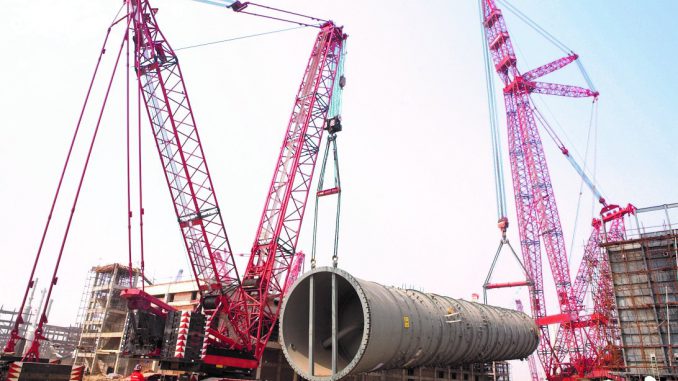
Allcargo Logistics Ltd. is on a roll with rapid diversification – transforming itself from a niche ocean transport service provider to a logistics integrator.
Mumbai-based Allcargo, the parent of global non-vessel-operating common carrier (NVO) ECU Worldwide, has concluded two significant investment deals in the past weeks to cement its position in Indian logistics verticals.
The big bet on that integrator push came when the company announced the acquisition of a controlling stake in domestic express logistics leader Gati Ltd., reportedly for Rs. 416 crore (US$58 million). The 44.6 percent buy of Hyderabad-headquartered Gati is particularly significant as it could open a window for Allcargo to step into the shoes of global express delivery giants, such as DHL, UPS, or FedEx, in the long run.
Founded in 1989, Gati boasts a pan-India network covering some 19,000 delivery points, along with a fleet of more than 5,000 trucks, including temperature-controlled vehicles, approximately 2,500 last-mile e-commerce delivery assets, and about 3 million square feet of warehousing space across the country. In addition, the company has offices in several overseas locations.
“The exponential rise in cross-border and domestic e-commerce has opened up new markets for traditional express players such as Gati. With Allcargo’s existing strength in the ocean transportation business and Gati’s expertise in land and air transportation, we are now in a unique position to offer our customers a suite of truly multimodal solutions,” Shashi Kiran Shetty, chairman of Allcargo Group, said.
Currently, freight forwarding or NVO activity accounts for the bulk of Allcargo’s revenue pie, which contributed Rs. 1,697 crore out of Rs. 1,873 crore in group income during the July-September quarter.
The Gati deal also puts Allcargo on a stronger footing for further expansion of its mainstay ocean transport play, given the former’s existing joint venture with Japanese international freight forwarder Kintetsu World Express (KWE) for less-than-containerload (LCL) shipments. Established in 2012, the JV is 70 percent owned by Gati and 30 percent by KWE.
“This partnership will allow Allcargo and KWE to jointly explore and pursue further collaborations within and outside India,” Allcargo said.
Allcargo noted that the Indian market holds high growth potential for express logistics offerings, propelled by tax reforms, digitisation, burgeoning domestic consumption, rising cross-border e-commerce volumes, and expected demand growth from small and medium B2B [business-to-business] businesses.
“This important deal was done to align the group to the growing Indian transportation and logistics market which is expected to further consolidate owing to the digital push and continued reforms pursued by the Indian government,” the company said. “This will help Allcargo achieve sustained growth as a leader in the logistics industry and continually grow in the short, medium, and long run.”
Further, Allcargo is poised to make deeper inroads into the Indian landside logistics space on the strength of a Rs.380 crore-investment it secured last week from private equity group Blackstone. The debt and equity financing deal is part of a move to raise resources for the development of various inland projects in the midst of construction or in the planning stages.
“Allcargo will retain a minority stake in the various logistics assets and transfer its debt as it relates to these specific assets to their relevant subsidiaries,” the Mumbai-based company said. “This partnership will help Allcargo’s growing 3PL [third-party logistics] business and enable MNCs [multinational companies] and Indian companies to access world-class warehousing assets.”
India has lately given logistics issues a high priority on its development policy agenda. Most notably, an “infrastructure status” awarded to the sector in early 2017 has made securing funding much easier for logistics players.
The other “X factor” came in July 2017 when the government rolled out the Goods and Services Tax (GST) – a nationwide, unified indirect tax regime that eliminated the cascading effect of multiple taxes on supply chains. In addition, ongoing efforts towards an integrated multimodal logistics and transport policy – to switch from a point-to-point transportation system to a hub-and-spoke model involving the development of low-volume freight corridors – are expected to pay good dividends for the sector.

